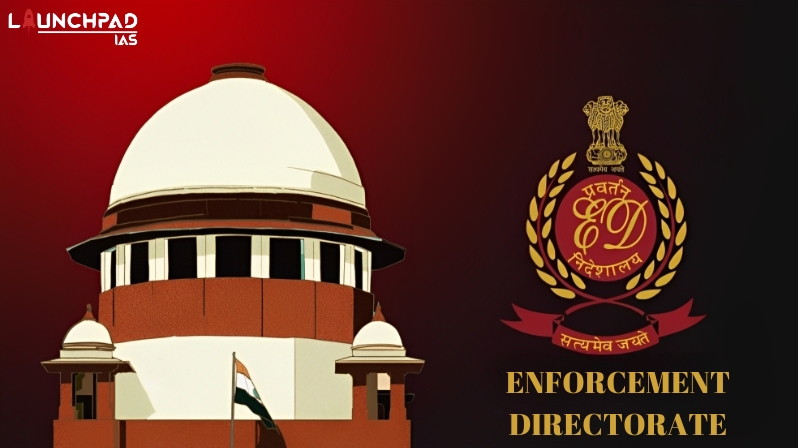What is the Directorate of Enforcement (ED)?
- The Directorate of Enforcement (ED) is a multi-disciplinary organization mandated with the investigation of offences of money laundering and violations of foreign exchange laws.
- It functions under the Department of Revenue of the Ministry of Finance.
- As a premier financial investigation agency of the Government of India, the Enforcement Directorate functions in strict compliance with the Constitution and Laws of India.
Where does the Genesis of ED Lie?
- The origin of this Directorate goes back to 1st May 1956, when an ‘Enforcement Unit’ was formed in the Department of Economic Affairs for handling Exchange Control law violations under the Foreign Exchange Regulation Act (FERA), 1947.
- It was headquartered in Delhi, headed by a Legal Service Officer as the Director of Enforcement.
- It had two branches – in Bombay and Calcutta.
- In the year 1957, this Unit was renamed as ‘Enforcement Directorate’, and another branch was opened at Madras (now Chennai).
- In 1960, the administrative control of the Directorate was transferred from the Department of Economic Affairs to the Department of Revenue.
- With the passage of time, FERA 1947 was repealed and replaced by FERA, 1973.
- With the onset of the process of economic liberalisation, FERA, 1973, which was a regulatory law, was repealed and in its place, a new law viz. the Foreign Exchange Management Act, 1999 (FEMA) came into operation w.e.f. 1st June 2000.
- Further, in tune with the International Anti Money Laundering regime, the Prevention of Money Laundering Act, 2002 (PMLA) was enacted and ED was entrusted with its enforcement w.e.f. 1st July 2005.
What is the Structure of ED?
- Hierarchy: The Directorate of Enforcement, with its headquarters in New Delhi, is headed by the Director of Enforcement.
- There are five regional offices in Mumbai, Chennai, Chandigarh, Kolkata and Delhi headed by Special Directors of Enforcement.
- The Directorate has 10 Zonal offices each of which is headed by a Deputy Director and 11 sub Zonal Offices each of which is headed by an Assistant Director.
- Recruitment: Recruitment of the officers is done directly and by drawing officers from other investigation agencies.
- It comprises officers of IRS (Indian Revenue Services), IPS (Indian Police Services) and IAS (Indian Administrative Services) such as Income Tax officers, Excise officers, Customs officers, and police.
- Tenure: In November 2021, the President of India promulgated two ordinances allowing the centre to extend the tenure of the directors of the Central Bureau of Investigation (CBI) and the Enforcement Directorate from two years to up to five years.
2021 Amendment:
- It requires High-Level Committees to recommend the officers for service extensions.
- A five-member panel composed of the Central Vigilance Commissioner and Vigilance Commissioners had to recommend if an ED Director was worthy of an extension in service.
- In the case of the CBI Director, a High-Level Committee of the Prime Minister, Opposition Leader and the Chief Justice of India had to recommend.
- The Delhi Special Police Establishment (DSPE) Act, 1946 (for ED) and the Central Vigilance Commission (CVC) Act, 2003 (for CV Commissioners) have been amended to give the government the power to keep the two chiefs in their posts for one year after they have completed their two-year terms.
- The chiefs of the Central agencies currently have a fixed two-year tenure, but can now be given three annual extensions.
- However, no further extension can be granted after the completion of a period of five years in total including the period mentioned in the initial appointment.
- In July 2023, The SC upheld statutory amendments which facilitate the tenures of Directors of the Central Bureau of Investigation and the ED to be stretched “piecemeal” but held illegal extension given to the outgoing ED Chief.
What are the Statutory Functions of ED?
The statutory functions of the Directorate include the enforcement of the following Acts:
- COFEPOSA: Under the Conservation of Foreign Exchange and Prevention of Smuggling Activities Act, 1974 (COFEPOSA), this Directorate is empowered to sponsor cases of preventive detention concerning the contraventions of FEMA.
- Foreign Exchange Management Act, 1999 (FEMA): It is a civil law enacted to consolidate and amend the laws relating to facilitating external trade and payments and to promote the orderly development and maintenance of the foreign exchange market in India.
- ED has been given the responsibility to conduct an investigation into suspected contraventions of foreign exchange laws and regulations and to adjudicate and impose penalties on those adjudged to have contravened the law.
- Prevention of Money Laundering Act, 2002 (PMLA): Following the recommendations of the Financial Action Task Force (FATF) India enacted PMLA.
- The ED has been entrusted with the responsibility of executing the provisions of PMLA by investigating to trace the assets derived from proceeds of crime, provisionally attaching the property and ensuring prosecution of the offenders and confiscation of the property by the Special court.
- Fugitive Economic Offenders Act, 2018 (FEOA): Lately, with the increase in the number of cases relating to economic offenders taking shelter in foreign countries, the Government of India introduced the Fugitive Economic Offenders Act, 2018 (FEOA) and ED is entrusted with its enforcement.
- This law was enacted to deter economic offenders from evading the process of Indian law by remaining outside the jurisdiction of Indian courts.
- Under this law, the ED is mandated to attach the properties of fugitive economic offenders who have escaped from India warranting arrest and provide for the confiscation of their properties to the Central Government.
Also check out: GUJRAL DOCTRINE


